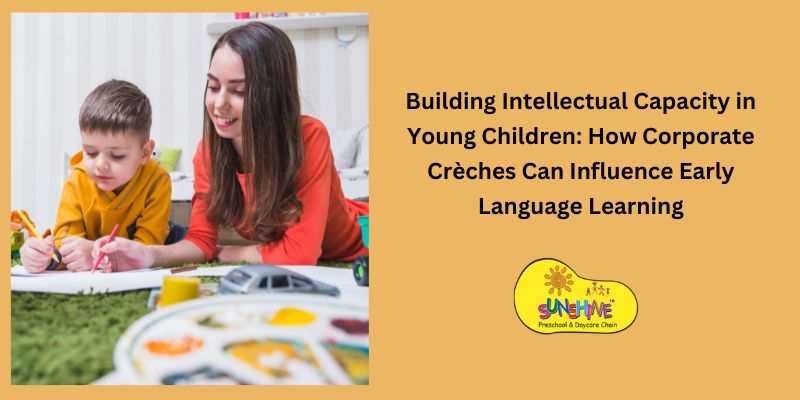Building Intellectual Capacity in Young Children: How Corporate Crèches Can Influence Early Language Learning

Did you know that children develop nearly 1 million new neural connections every second in their early years? These rapid connections form the basis of how they think, communicate, and learn. Research by Harvard’s Centre on the Developing Child shows that early language exposure is one of the most potent predictors of future learning success, influencing not just academic ability but also emotional and social intelligence.
Language is more than just communication; it is the foundation of thinking, reasoning, and problem-solving. As children learn to express ideas and emotions, they also begin to develop memory, comprehension, and creativity. For working parents, corporate crèches offer an ideal environment to nurture these skills. They combine structured learning with professional care, ensuring children develop strong language foundations that support long-term intellectual growth.
Understanding the Role of Language Development in Intellectual Growth
Language development is one of the most crucial aspects of early childhood. It shapes how children process information, solve problems, and interact with others. From infancy, children begin to make sense of the world by associating sounds and words with objects and actions.
The role of language in children’s intellectual development and learning extends far beyond speech. It enhances cognitive skills such as reasoning, focus, and critical thinking. When children engage in conversations, listen to stories, or describe their experiences, they build essential mental frameworks that support lifelong learning.
Strong early language skills are also key predictors of academic success. Studies show that children exposed to rich vocabulary and conversation at a young age perform better in reading, writing, and comprehension later in school. In other words, the earlier a child’s language development begins, the stronger their foundation for intellectual and emotional growth.
How Corporate Crèches Support Early Language Learning
- Corporate crèches go beyond providing childcare; they are structured early learning environments designed to stimulate both language and cognitive development. These centres play a vital role in supporting the intellectual growth of young children while giving working parents the peace of mind they need.
- Proximity to parents: Crèches located within or near workplaces allow parents to stay engaged in their child’s development. This proximity fosters the child's emotional security and reduces the parent's stress, helping both thrive.
- Structured environment: Corporate crèches follow a curriculum that encourages linguistic development through storytelling, rhymes, reading circles, and interactive conversations. These activities expose children to new vocabulary, sentence structures, and communication patterns, enhancing comprehension and expression.
- Peer interaction and guided conversation: Children learn best by listening and imitating. In a crèche setting, frequent peer interaction helps them practice speaking, while trained caregivers ask open-ended questions and encourage children to express their thoughts confidently.
Through this mix of professional guidance and structured exposure, corporate crèches provide an early learning environment that supports every stage of language development—ensuring children are intellectually prepared for formal schooling.
Early Learning Frameworks in Corporate Crèches: How Structured Language Programs Build Intellectual Growth
High-quality corporate crèches align their early education methods with India’s National Early Childhood Care and Education (ECCE) Policy (2013) and National Education Policy (NEP 2020), both of which emphasise language-rich learning environments as the foundation of intellectual capacity.
Structured early learning programs in these settings typically include:
- Storytelling and phonics sessions that enhance listening skills, pronunciation, and comprehension.
- Bilingual exposure boosts memory and problem-solving abilities.
- Interactive reading and song-based activities which improve vocabulary and rhythm recognition.
- Conversation-based learning, where caregivers model correct speech and encourage expressive communication.
These methods help children strengthen their neural pathways for understanding and communication. When children are regularly engaged in structured programs, they not only acquire language more quickly but also develop stronger analytical, emotional, and creative abilities.
By implementing these frameworks, corporate crèches become active contributors to national education goals, helping ensure that every child enters formal schooling with the linguistic and intellectual readiness required for success.
Real-World Examples of Corporate Crèches Promoting Language Development
Leading organisations in India are increasingly investing in corporate crèche facilities that focus on early language development and cognitive growth:
- ONGC: The company’s crèche programs emphasise early language exposure through storytelling, phonics, and group activities that enhance vocabulary and comprehension.
- TATA Advanced Systems: Structured reading and conversation-based activities are incorporated into daily routines to help children develop stronger communication and listening skills.
- Hindustan Coca-Cola Beverages: The organisation’s childcare initiatives encourage language and social development through collaborative play, storytelling, and guided conversations.
- Dr Reddy’s Laboratories: Interactive sessions, bilingual exposure, and creative learning techniques are used to strengthen both linguistic and cognitive abilities.
These examples reflect how well-planned corporate crèche programs can nurture children’s intellectual capacity while also supporting working parents with reliable, development-focused childcare solutions.
Benefits of Corporate Crèches for Employers
Investing in a corporate crèche is more than a gesture of goodwill; it is a strategic investment in business productivity and long-term growth.
- Higher employee retention: Parents are more likely to stay with a company that supports their family needs. Many organisations offering childcare support see significant retention rates among employees returning from maternity leave.
- Improved focus and productivity: With children in a nurturing and educational environment, parents can work with peace of mind and reduced stress.
- Enhanced employer branding: Providing family-friendly infrastructure, such as corporate crèches, strengthens a company’s reputation as a progressive and people-centric workplace.
Crèches that incorporate structured language learning also indirectly enhance the intellectual and emotional development of future generations—creating a positive social impact that reflects well on the organisation’s values.
The Future of Corporate Crèches: Evolving to Meet the Needs of Young Learners
The future of corporate crèches lies in innovation and inclusivity. With evolving work models and technological advancements, crèches are integrating digital storytelling, AI-powered language learning tools, and interactive curriculum management systems to make early education more personalised.
In the coming years, hybrid and near-site childcare models will make these facilities even more accessible to parents working in flexible setups. Crèches will increasingly serve as an extension of India’s early education system, complementing government initiatives under NEP 2020 by promoting universal access to quality early learning.
By combining structured pedagogy with emotional support, corporate crèches will continue to shape a generation of confident, intellectually capable, and linguistically skilled young learners.
Conclusion: Empowering the Next Generation Through Language and Learning
Language is not only a means of communication; it is the foundation of learning, imagination, and critical thinking. When nurtured during infancy and early childhood, it builds the cognitive pathways that determine how children understand, reason, and grow. Corporate crèches play an essential role in creating environments that nurture these abilities. Through structured programs, trained caregivers, and continuous parental engagement, they lay the foundation for a child’s intellectual and linguistic success.
For employers, this is more than a social responsibility; it is an investment in their workforce’s stability and the next generation’s potential. Partner with Sunshine Preschool & Corporate Crèche to design a customised on-site or near-site childcare solution that fosters early language learning, supports working parents, and builds a stronger, future-ready organisation.



Leave a Reply Cancel reply